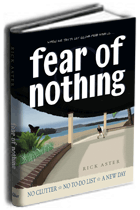It was a cold and stormy winter at my place. One of the pipes froze — ironically, a hot water pipe, but that tells you how cold it was. The power was out for four days. The well broke. When it was all over, I noticed that my file cabinet also got wet.
This caught me by surprise, as this was a molded plastic file cabinet that would ordinarily protect files from water, or that is what I had expected. Nevertheless, I found that all my files were damp, and some were beginning to show a few spots of mold. To save the files, I would have to scan them. I have spent the last six days sorting through the files. I peeled the pages apart, dried them enough to place them on the flatbed scanner, and scanned them one by one.
Fortunately, I did not have to scan everything. I have been relying less on paper files and had already scanned many of the most important paper files. For five years I had been scanning all new papers that came in, so the paper files were all at least five years old. Some file folders were actually empty. I had multiple copies of many of the papers. There were a dozen owner’s manuals that I could download instead of scanning. I discarded all of the magazine clippings I had set aside for reference. There were still 1,000 pages I decided to scan. In ideal circumstances I can scan 100 pages in an hour, but when paper has to be dried first, and it’s wrinkled, and pages have to be peeled apart, it takes much longer. It’s also fortunate that I didn’t have many pressing deadlines, and I was able to set aside many of my duties and hobbies to urgently convert my files to digital form.
The outcome too was fortunate, or perhaps I should say that my burst of action was rewarded: there weren’t any essential files that were too water-damaged to save. I finished scanning a few hours ago, and I have a computer folder of image files with descriptive names and dates so I can sort them out later. I saved just two dozen documents on paper. These were the papers you would probably expect anyone to keep, such as government-issued certificates and school transcripts. I am not sure what I will do with the file cabinet, which is none the worse for the incident. It seems unlikely that I will ever again have enough papers to fill up a file drawer. I may want to get a little waterproof (heck, fireproof) box for my few remaining paper files.
I have written before about my file cabinet. A few years ago I had a five-drawer file cabinet, and those drawers were filled with files. I decided the five-drawer cabinet was too large, and with some difficulty I reduced the size of the files to fit in two drawers. Scanning technology improved and I switched to digital filing for everything new. My remaining paper files gradually became obsolete, so that when I got around to scanning my water-damaged file cabinet, it was not two drawers that I scanned, but barely a thousand pages, less than half of one drawer. Files have a way of expanding to fill the space you allocate to them, and my experience seems to bear this out. Now that I am no longer using a file cabinet, I expect to find that there are hardly any files to keep.
During my days of scanning I couldn’t help thinking that it would have been easier if I had done it before the files got wet. For that matter, throwing away the files I didn’t need would have gone better too — I could have put them in paper recycling instead of relegating them to the compost heap. But these are similar to the risks you find with owning any physical object, and it is one of several arguments for owning and keeping only the things you might actually need.



No comments:
Post a Comment